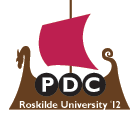| INDUSTRY CASES | WEDNESDAY 15:30-16:30 | GRAND AUDITORIUM |
Reflexivity in Industrial Practice
Session chair: Jacob Buur, University of Southern Denmark
Participatory design and human factors within the Norwegian oil and gas industry
Aga Skorupka, Human Factors Solutions
Adam Balfour, Human Factors Solutions
Dominika Turzynska, Human Factors Solutions
Abstract. This paper presents industry experience of using the participatory design approach in the Norwegian oil and gas industry. An overview of unique regulatory requirements regulating end-user participation will be given along with some specific examples. The regulatory overview includes national regulations, (e.g. HSE Framework regulations), international standards (e.g. ISO 11064) and industry standards such as Norsok S002. The benefits of end user participation will be noted. We will outline some of the challenges that we have faced ensuring end-user participation in the offshore oil and gas industry and provide practical examples. A case will be presented. The presentation will conclude with specific proposals on how to improve end-user participation in the industry.
Cross-organizational collaborative approach to user experience framework development to enrich product development practices
Delia Grenville, Intel Corporation
Abstract. Like many corporations, the evolution of high-tech, social media trends, and continued thrust towards increased personalization in computing has impacted both our product development philosophy and our organization’s culture. Consumers and employees alike expect products that better represent our experiences as people. In the last year, my team has focused on three vectors—connection, intention, and transformation —in the development of a corporate user-experience (UX) framework for our products. The naming of the vectors corresponds to the UX practices that we have identified to develop better product experiences. The vectors also acknowledge the cultural activation that is essential to creating a self-sustaining experience-driven product development community within our corporation. Both participatory design and a collaborative approach are allowing the community to thrive and position us to support common goals for our corporate-level user experience design agenda. This paper focuses on the co-design of the user experience practices to be adopted by the organization.
How can I help you today? The knowledge work of call center agents
Peggy Szymanski, PARC
Patricia Swenton-Wall, Xerox Research Center Webster
Luke Plurkowski, PARC
Jennifer Englert, Xerox Research Center Webster
Abstract. This paper reflects on an industry case study conducted in two outsourced call centers to explore the human side of their turnover problem. At the project’s onset, management did not consider it necessary to get input from their agents as they already had a thorough knowledge of their organization’s operations based on financial analyses and employee surveys. However when we brought back examples from the field showing agent work as complex, dynamic, stressful knowledge work, management began to see the value of soliciting input from their front-line employees. What started as a turnover investigation resulted in an organizational learning initiative to capture and propagate the “human” side of call center work. In the end, we shadowed agents through their shift to create “A day in the life of a call agent” video documentary so that organization-wide all could appreciate the complexity of call agent work.
